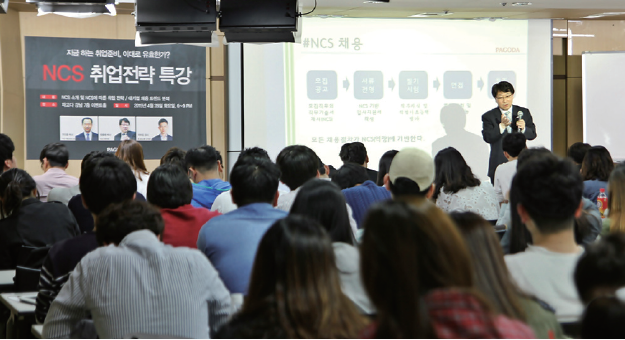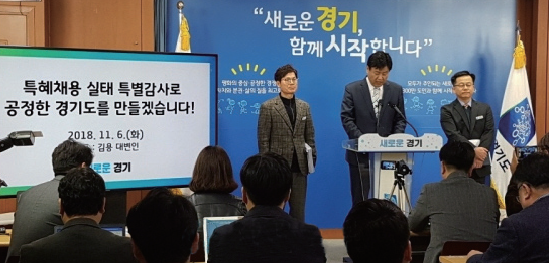Recently, it has become quite easy to notice Kingos talking to people in booths in front of the Business School Building on the Humanities and Social Sciences Campus. These booths are “recruiting booths” that have been set up in line with the recruitment season, showing Kingos’ high interest in the job market. In recent years, there has been a major shift in the job market, attracting the attention of more and more applicants. In response to this shift, the Sungkyun Times (SKT) now looks into the changes and the problems that have arisen due to the abrupt changes in the market and suggests the possible solutions that may solve these issues.
Recent Changes in the Job Market
From Spec to Competency
Before the mid-2010s, job recruitment was determined mainly by a term commonly used in Korea known as “spec,” short for specifications, referring to qualifications such as educational background, grades, English test scores, and volunteer activities listed on a job candidate’s résumé. During the period of rapid economic growth, companies recruited and fostered “generalists” who can handle various tasks regardless of job aptitude in order to flexibly utilize manpower. Recruitment based purely on spec, however, has resulted in an inefficiency in the productivity of enterprises by causing a mismatch between the capabilities required in practice and those of a work seeker. In addition, such a method does not properly reflect the aptitude of the job seeker, resulting in a social loss associated with the person leaving the company due to a mismatch. This also adds to the burden of job seekers who try to make their spec as fancy as possible in attempt to get employed. As global competition intensifies, however, it has become important for both the private sector and the nation to allocate the best human resources to appropriate tasks and nurture them in order to minimize inefficiency in society and social costs. Thus, evaluating job competency, rather than evaluating a spec, has become important in the hiring process of companies. To support this trend, the Korean government adopted the National Competency Standards (NCS), a standardization of the knowledge and evaluation elements of job performance, and required the adoption of the standard from all public agencies since 2015. This new standard eliminates or reduces the importance of unnecessary spec, which might be far from the actual job competency, by systematically organizing the required knowledge and evaluation elements for each job. For example, Incheon International Airport’s offices and control sector evaluate résumés and give a written test based on required job skills specified by the NCS, without putting into consideration the unspecified elements.
The Rise in Need for Fair Employment
Before the mid-2010s, most job applicants were required to fill in names, regions of origin, age, and gender on their résumés. These requirements, like a spec, have nothing to do with work capability and have concerns of discrimination. For example, if an enterprise prefers male employees to female employees, the enterprise might filter the applicants’ gender based on their résumés and even unfairly discriminate against female applicants. Such discrimination can cause social costs by excluding highly competent works based on elements not related to work capacity at all. This can also become an obstacle towards a fair society in the long run. To prevent these problems, blind recruitment has been adopted to all public agencies at the national level so that applicants can be judged solely based on their abilities without discrimination. Moreover, the government has been encouraging private companies to utilize blind recruitment as well, which has resulted in a gradual expansion of blind recruitment in private companies, such as at some affiliates of the SK Group in Korea. As such, the NCS and blind recruitment are in accordance with excluding unnecessary elements from the recruitment process and evaluating applicants solely by their work abilities, and the government is trying to expand the implementation of the two in the job market overall. Due to the abrupt introduction of the NCS and blind recruitment between 2015 and 2017, however, the job market has been suffering turmoil. Therefore, measures will be needed to ease the concerns over the new selection systems in the Korean job market.

The Problems Associated with NCS and Blind Recruitment
➊ Issues Arising from the Adoption of NCS
Concerns over the Effectiveness of its Evaluation
There are some concerns over whether the NCS effectively evaluates job capability firstly because sufficient preexamination of the effectiveness of the NCS failed to take place. In fact, the development of the NCS began in 2014, and the NCS was employed only a year later in 2015 starting with governmental organizations. Moreover, the fact that the Korean government consigned production of examination questions to an external organization caused numerous issues. The outsourcing of this led tests administered by different organizations to give tests with the same examination questions. For example, the same five questions from the Korea Midland Power (KOMIPO)’s NCS test held in November 2017 also appeared on the KB Kookmin Bank’s NCS test held in October 2018. Additionally, some test questions were irrelevant to the field in which the examinee aspired to work. Second, there are concerns regarding the current evaluation system based on written tests. While most western companies evaluate practical and on-the-job skills by adopting internship programs, most Korean companies use written tests suited for large-scale selection systems. Such written tests usually fail to properly evaluate the applicants’ abilities, as the actual work that the applicants do when they are employed is drastically different from the multiple-choice questions on the NCS tests.
Boom of Yet Another Private Education Industry
Up to this point, the adoption of the NCS testing remained mainly based on written tests and face-to-face interviews rather than employing a new type of hiring method. Therefore, since the NCS ultimately evaluate applicants based on their test taking skills to provide answers that interviewers would like to hear, it fosters the growth of private education that teaches applicants how to behave like “ideal” employees to companies. Moreover, because this new type of recruitment requires skills that are usually not taught in schools, it has increased pressure on the applicants to become more prepared on their own. This increase in pressure has caused many applicants to knock on the doors of private recruitment training academies with an expensive price tag. Therefore, overall, whether the adoption of NCS has truly decreased the cost of employment preparation as it initially intended remains doubtful.
➋ Issues Concerning Blind Recruitment
Ambiguous Evaluation Criteria of Blind Recruitment
Additionally, the evaluation criteria of NCS differs from organization to organization. There are two types of blind recruitment: complete and quota-based. The former refers to when all the biased aspects are hidden from the evaluator. On the other hand, the latter is when certain quotas are applied based on, for example, the place of origin, meaning that there is a set percentage of applicants who must be hired from a selected region. Korea currently maintains regional and female quotas to overcome the glass ceiling caused by such bias factors, but there exist differences between organizations that do and do not apply the quotas during their recruitment process. In fact, the Korea International Exhibition Center (KINTEX), caused controversy by setting the percentage of hired male applicants to 40% of the entire pool of applicants, when the law states that at least 30% of any one gender must be represented in an organization. Without such a quota that raises the minimum percentage of a certain gender to 30%, only 20% of the male applicants were originally qualified to be hired. Moreover, the regional quota meant to encourage the growth of rural area applicants also has ambiguous evaluation criteria. For example, a person who grew up in a rural area, but attended a university in Seoul, may not be considered as part of the quota.
Unresolved Unequal Employment
The core mission of blind recruitment is to remove bias stemming from unchangeable factors such as personal background, but there have been examples observed in the past in which the bias has not been removed during the blind recruitment process. For equal selection to occur in blind recruitment there must be no existing relationship between the hiring manager and the applicant. When the Seoul Metro switched 1285 of its contracted employees to permanent positions, however, 108 of the hired employees were found to be at least second cousins to the current employees at the organization. Likewise, there are risks in hiring managers checking applicant information and giving additional credits or necessary information that may help increase the applicants’ chances of getting hired.

Possible Directions for Improving the Korean Hiring System
Change in the NCS
First, a change must occur in the hiring process that currently implements large-scale written tests and face-to-face interviews that do not evaluate job capabilities. Instead of giving Human Resources full responsibility in recruitment, partial responsibility in hiring must also be given to the business department in which the applicant will work in when hired. Moreover, instead of hiring a large number of employees at once, the companies and organizations using blind recruitment have to take enough time to thoroughly screen and evaluate their applicants’ job capabilities. For example, Google’s hiring process requires a phone interview and both secondary and tertiary face-to-face interviews that test job capabilities. Then, the interviewing manager needs to receive a final confirmation from the Chief Executive Officer (CEO) before deciding to hire the applicant. As such, the ample amount of invested time yields recruitment of workers who are well prepared for the job. Moreover, the change from simple written tests to the evaluation of job capabilities that tests practical knowledge will limit the growth of the private education industry that teaches mere test skills and tactics.
Changes in Blind Recruitment
Changes need to occur in blind recruitment for it to get rid of employment corruption and encourage fair recruitment. Therefore, the Korean governmental and civil organizations should employ sanctions that penalize bias in recruitment. One exemplary case that Korea can follow is that of the United States (US). According to the US Equal Employment Opportunity Commission (EEOC), fines ranging from $50,000 to $300,000 on average are awarded to employers found to have discriminated against applicants based on their race, gender, age, pregnancy, or military status. As for the private sector, the American company General Electric (GE) created a system where the Human Resources and inhouse lawyers preapprove the employment and promotion of a worker. Moreover, the recruitment of an external business developer or a non-profit worker also needs to be confirmed. Likewise, it is necessary for Korea to adopt such policies to bring positive changes in the country’s recruitment culture.
Fundamental Changes in Education System
In recent times, the idea that “the rich-get-richer and the poor-get-poorer” has become a reality as the economic and social status of parents has increasingly played a significant role in their children’s pursuit of education and jobs. In the midst of such a phenomenon in Korea, blind recruitment can serve the role of overcoming the related culture of relying on private education and intensifying elitism. In order for such changes to occur, fundamental changes in the education system are necessary. The expansion of higher quality primary and secondary education and support of low-income students is vital for education to increase mobility between economic and social classes. Moreover, changes in the secondary and tertiary education systems should be made to yield leaders of the future with creative minds. The current, relatively passive injection of knowledge within Korean school systems has produced applicants suited for problem-solving rather than solution-deriving. Therefore, the education system can refer to the example of Finland’s education system, which ranks consistently high in the comprehensive world education ranking report by the Organization for Economic Cooperation and Development (OECD) countries, even without standardized testing like in Korea. Not only does Finland have high-performing students, but the country also ranks high in business innovation among countries in the European Union (EU), demonstrating how a strong education system can yield innovative workers.

If emphasis on practical job capabilities continues to occur without answering the question of who is responsible for education and training, then it will only increase the pressure on the applicants to become prepared workers by themselves. The fact that the NCS-based private education industry has grown as large as the government workers’ private education industry supports that fact. Equal recruitment needs to be pursued in Korean society. Not all jobs, however, will be equally distributed via blind recruitment alone. Therefore, society should work together to create a better work culture that fosters growth of an individual and his or her capabilities. The improvement of the current blind recruitment system needs to take place in order to bring about positive changes in the future.
